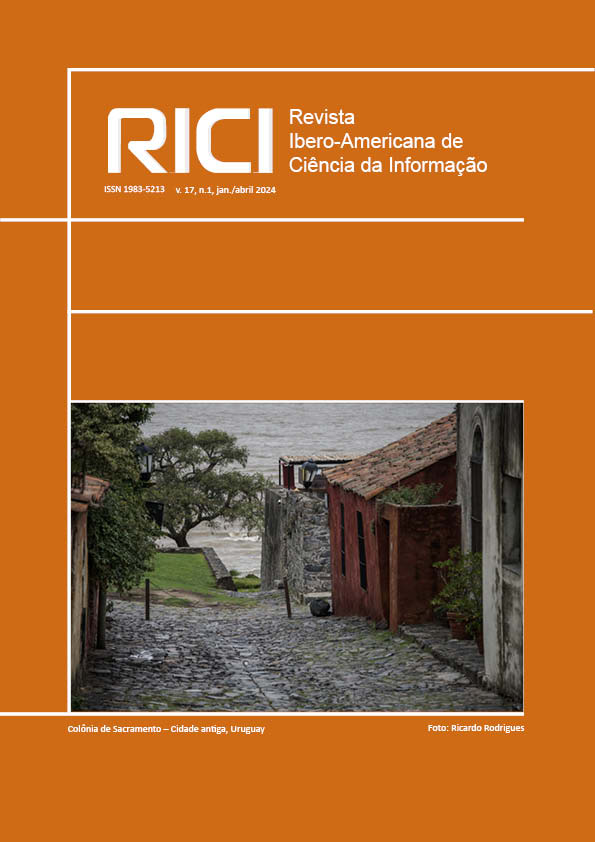Artificial Intelligence and ChatGPT:
perspectives and challenges for Bibliographic Classification
DOI:
https://doi.org/10.26512/rici.v17.n1.2024.50429Keywords:
Library Science, Bibliographic Classification, ChatGPT, Artificial IntelligenceAbstract
It presents perspectives and challenges of applying Artificial Intelligence in the field of Library Science. To this end, it focuses on the practice of Bibliographic Classification and conducts a comparative study between the results obtained through classification performed by a human and by ChatGPT, the chatbot tool used in this analysis. The study is based on the Dewey Decimal Classification and the Universal Decimal Classification. The results revealed significant divergences between both methods, exposing mistakes and hallucinations of the generative AI model GPT-3.5, on which the current free version of ChatGPT is based. Challenges and limitations to the effective applicability of ChatGPT in the context of Bibliographic Classification are highlighted, as well as the relevance of the librarian in the practice of classification and thematic analysis, given the importance of mental exercise and critical analysis in interpreting the subject to be classified. It should be noted that the study does not conduct a comprehensive comparative analysis. The need for future, more comprehensive investigations with different perspectives from human experts and AI models is emphasized.
Downloads
References
Almeida, Vergílio. IA Generativa: oportunidades, riscos e governança. 18 maio 2023. Apresentação Power Point. Disponível em: https://iagenerativa.ceweb.br/ Acesso em: 11 jun. 2023.
Andrade, Rodrigo de Oliveira. ChatGPT reacende debate sobre o potencial criativo de sistemas de linguagem natural e as implicações éticas relacionadas ao seu uso. Pesquisa FAPESP, São Paulo, v. 325, n. 17, p.17-22, 2023. Disponível em: https://revistapesquisa.fapesp.br/wp-content/uploads/2023/03/016-022_capa-chatgpt_325-Parte-1.pdf. Acesso em: 17 jun. 2023.
Anjos, Liane dos. Sistemas de classificação do conhecimento na filosofia e na biblioteconomia: uma visão histórico-conceitual crítica com enfoque nos conceitos de classe, de categoria e de faceta. 2008. Tese (Doutorado em Cultura e Informação) - Escola de Comunicações e Artes, Universidade de São Paulo, São Paulo, 2008. Disponível em: https://www.teses.usp.br/teses/disponiveis/27/27151/tde-10112010-114437/pt-br.php. Acesso em: 29 maio 2023.
Aranalde, Michel Maya. Reflexões sobre os sistemas categoriais de Aristóteles,Kant e Ranganathan. Ciência da Informação, Brasília, v. 38, n. 1, 2009, p.86-108. Disponível em: https://revista.ibict.br/ciinf/article/view/1257. Acesso em: 14 jun. 2023.
Barbosa, Alice Príncipe. Teoria e prática dos sistemas de classificação bibliográfica. Rio de Janeiro: Instituto Brasileiro de Bibliografia e Documentação, 1969. 441p.
Brady, Damian. What developers need to know about generative AI. [S. l.], 2023. Github Blog. Disponível em: https://github.blog/2023-04-07-what-developers-need-to-know-about-generative-ai/. Acesso em: 12 jun. 2023.
Carvalho, Tiago. CDD x CDU: um estudo comparativo. 2018. Monografia (Bacharelado em Biblioteconomia) - Faculdade de Ciência da Informação, Universidade de Brasília, Brasília, 2018. Disponível em: https://bdm.unb.br/handle/10483/20901. Acesso em: 14 jun. 2023.
CHATGPT - Release Notes: the latest update for ChatGPT. OpenAI, [S. l.], 2023. Disponível em: https://help.openai.com/en/articles/6825453-chatgpt-release-notes#h_2818247821. Acesso em: 17 jun. 2023.
Cortiz, Diogo. Entendendo as alucinações do ChatGPT. Diogo Cortiz, [S. l.], 2023. Disponível em: https://diogocortiz.com.br/entendendo-as-alucinacoes-do-chatgpt/. Acesso em: 2 jul. 2023.
Daugherty, Paul, Ghosh, Bhaskar; Narain, Karthik; Guan, Lan; Wilson, Jim. Uma nova era da IA generativa para todos: a tecnologia que sustenta o ChatGPT vai transformar o trabalho e reinventar as empresas. [S.l.]: Accenture, c2023. Disponível em: https://www.accenture.com/content/dam/accenture/final/accenture-com/document/Accenture-A-New-Era-of-Generative-AI-for-Everyone-PT-v2.pdf. Acesso em: 11 jun. 2023.
Davenport, Thomas H.; Mittal, Nitin. How Generative AI is changing creative work. Harvard Business Review, [S. l.], 2022. Disponível em: https://hbr.org/2022/11/how-generative-ai-is-changing-creative-work. Acesso em: 18 jun. 2023.
Dewey, Melvil. Dewey decimal classification and relative index. 23. ed. Dublin: OCLC, 2011.
Fernandes, Anita Maria da Rocha. Inteligência artificial: noções gerais. [S. l.]: Visual Books, 2005.
Gil, Antônio Carlos. Como elaborar projetos de pesquisa. 4. ed. São Paulo: Atlas, 2002. 200p.
Gil, Antônio Carlos. Métodos e técnicas de pesquisa social. 6. ed. São Paulo: Atlas, 2008. 220p.
Gill, Sukhpal Singh; KAUR, Rupinder. ChatGPT: Vision and challenges. Internet of Things and Cyber-Physical Systems, [S. l.], v. 3, 2023, p.262-271. Disponível em: https://doi.org/10.1016/j.iotcps.2023.05.004. Acesso em: 18 jun. 2023.
Lund, Brady D.; WANG, Ting. Chatting about ChatGPT: How may AI and GPT impact academia and libraries?. Library Hi Tech News, [S. l.], v. 40, n. 3, 2023. Disponível em: https://papers.ssrn.com/sol3/papers.cfm?abstract_id=4333415. Acesso em: 17 jun. 2023.
Maciel, Leandro. Editorial: ChatGPT and the ethical aspects of artificial intelligence. Revista de Gestão, São Paulo, v. 30, n. 2, p. 110-112. Disponível em: https://doi.org/10.1108/REGE-04-2023-207. Acesso em: 17 jun. 2023.
Miranda, Marcos Luiz. Instrumentos de Representação Temática da Informação I. Brasília: CAPES: UAB; Rio de Janeiro: Departamento de Biblioteconomia, FACC/UFRJ, 2018. 164p.
Piedade, Maria Antonieta Requião. Introdução à teoria da classificação. 2. ed. Rio de Janeiro: Interciência, 1983.
Russel, Stuart; NORVIG, Peter. Inteligência Artificial. Rio de Janeiro: Elsevier, 2013.
Sichman, Jaime Simão. Inteligência Artificial e sociedade: avanços e riscos. Estudos Avançados, v. 35, n. 101, p.37–50, jan. 2021. Disponível em: https://doi.org/10.1590/s0103-4014.2021.35101.004. Acesso em: 14 jun. 2023.
Wang, Skyler; Cooper, Ned; Eby, Margaret; Seo Jo, Eun. From Human-Centered to Social-Centered Artificial Intelligence: Assessing ChatGPT's Impact through Disruptive Events, ArXiv, [S. l.], 2023. Disponível em: https://doi.org/10.48550/arXiv.2306.00227. Acesso em 18 jun. 2023.
Downloads
Published
Versions
- 2024-03-28 (2)
- 2024-03-27 (1)
How to Cite
Issue
Section
License
Copyright (c) 2023 Renata Lima da Silva, Brisa Pozzi de Sousa

This work is licensed under a Creative Commons Attribution 4.0 International License.
Copyright Notice
Authors who publish in this journal agree to the following terms:
- Authors retain copyright and grant the journal right of first publication with the work simultaneously licensed under the Creative Commons Attribution License 4.0, allowing the sharing of work and recognition of the work of authorship and initial publication in this journal.
- Authors are able to take on additional contracts separately, non-exclusive distribution of the version of the paper published in this journal (ex.: distribute to an institutional repository or publish as a book), with an acknowledgment of its initial publication in this journal.
- Authors are permitted and encouraged to distribute their work online (eg.: in institutional repositories or on their website) at any point before or during the editorial process, as it can lead to productive exchanges, as well as increase the impact and citation the published work.
















